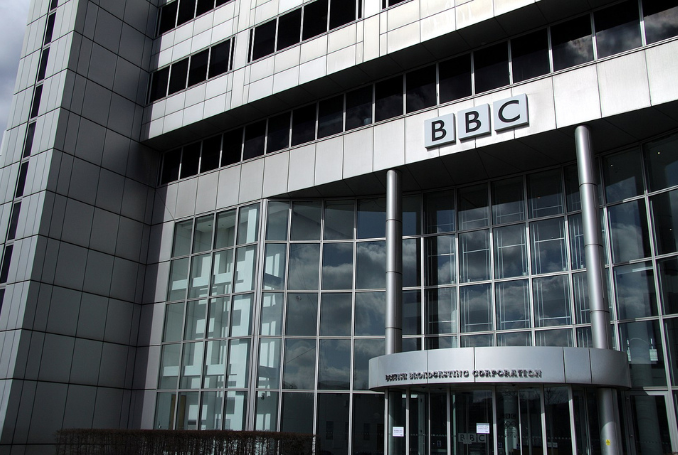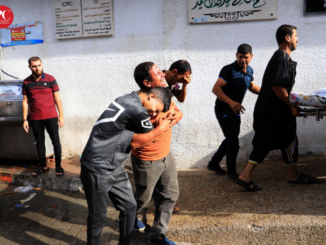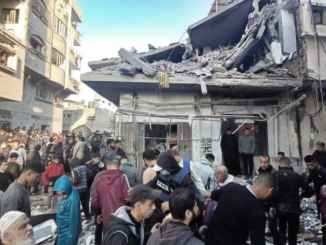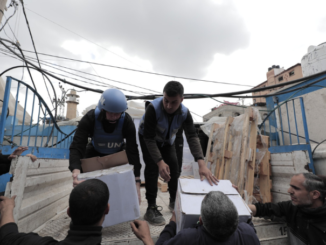
Employees of the BBC have accused the broadcaster of bias in its coverage of the Israeli onslaught on the besieged Gaza Strip.
The Al-jazeera News Network reports that eight UK-based employees of the corporation wrote a 2,300-word letter accusing the broadcaster of a “double standard in how civilians are seen.”
Fearing reprisal, the journalists requested anonymity, Aljazeera reports, adding that the group does not plan to send the letter to BBC executives. They believe “such a move was unlikely to lead to meaningful discussions”.
“The BBC has failed to accurately tell this story – through omission and lack of critical engagement with Israel’s claims – and it has therefore failed to help the public engage with and understand the human rights abuses unfolding in Gaza,” the letter states.
? This is another example of BBC bias & how they’re complicit in #Gaza_Genocide. The reporter refers to Palestinian children who have been kept hostage & locked up w/o trial as "teenage males".
Who is she & why is she not asking why so many children are locked up? #BoycottBBC pic.twitter.com/XAjdmuacnU
— Majid Freeman (@Majstar7) November 23, 2023
It adds: “Thousands of Palestinians have been killed since October 7. When will the number be high enough for our editorial stance to change?”
The journalists complained that terms like “massacre” and “atrocity” were used only to describe the actions of the Palestinian resistance group, Hamas. The BBC painted Hamas as “the only instigator and perpetrator of violence in the region,” which is “inaccurate but aligns with the BBC’s overall coverage,” the letter said.
“We are asking the BBC to better reflect and defer to the evidence-based findings of official and unbiased humanitarian organizations.
“The journalists, Aljazeera further reported, appealed to the corporation to “ensure that the equal treatment of all civilians is at the heart of its coverage”.
They claimed that the BBC “carefully portrays Israeli suffering by, for instance, telling audiences the names of victims, covering individual funerals, and interviewing affected families”, the network reported.
“In comparison, humanizing coverage of Palestinian civilians has been lacking. It is a poor excuse to say that the BBC could not better cover stories in Gaza because of difficulties gaining access to the [Gaza] Strip … Little attempt has also been made to fully utilize the abundance of social media content from brave journalists in Gaza and the West Bank.”
The letter said “it is largely in the last few weeks – as civilian deaths have exponentially increased and Western countries’ appetite for Israel’s attacks has waned – that the BBC has made more effort to humanize Palestinian civilians.”
It also reportedly insisted that the broadcaster did not provide context on the background of the current crisis, including “75 years of occupation, the Nakba, or the asymmetric death toll across decades.
Aljazeera reports that a BBC spokesperson denied the allegations, saying “throughout our reporting on the conflict the BBC has made clear the devastating human cost to civilians in Gaza and Israel.”
BBC journalists are accusing the organisation of “pro-Israel bias,” calling it out over its skewed coverage of Israel’s war on Palestine’s Gaza pic.twitter.com/5TQCvS6uzf
— TRT World (@trtworld) November 25, 2023
Until a humanitarian truce entered into force on Friday, November 24, the Palestinian Ministry of Health in Gaza announced that over 14,854 Palestinians, including nearly 6,150 children, with another 36,000 wounded. 7,000 Palestinians are missing, including more than 4,700 women and children.
(PC, RT)








I’ve called it the Bibi See for many years.
But, being Irish, I’ve observed its sophisticad PR-op-agenda up close under our own ongoing occuption.
A change of flag and anthem, as James Connolly observed, wil not bring independence from ye o£de Union Jackboot, without a fresh economic and legislative vision to replace the Ang£o-Norman feudal war cult elevation of individual property rights over the collective commonwealth.
His analysis seems more globally relevant as our planetary crises ramify and intensify with every year.
Bibi See.